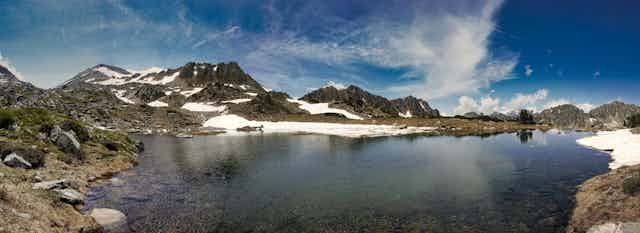

Dirk Schmeller a reçu des financements de Axa Research Fund.
Voir les partenaires de The Conversation France
Mountain ecosystems provide vital services to human life. Mountains sequester CO2, clean water and the air and regulate floods. Worldwide, they provide for the livelihoods of more than half of human society.
Climate change is particularly acute in mountains. The highly developed relief of the ranges creates many microclimates, ecosystems and therefore living spaces for numerous species. Quite a few of those species can only be found in mountains.
High-altitude mountain areas are projected to warm much faster than lowland regions. For the Pyrenees, which run along the border of France and Spain, warming of 0.57°C per decade has already been observed, while the rate is only 0.18°C in lowland France.
It is difficult to precisely predict temperature increases in mountains, but for the Pyrenees, the mean annual temperature has been estimated to be 2°C warmer than 1970, compared to 1.2°C in lowland France. This difference will only increase in the future.
Increased temperatures in mountain regions decrease the amount of snow that falls, causes snow and ice to melt earlier and accelerates deglaciation – the process by which glaciers retreat.
Increased temperatures also accelerate biochemical reactions such as photosynthesis in plants, increase the rates of many biological and ecological processes such as decomposition and sedimentation, organic carbon mineralisation, organismic growth (such as the time from egg hatching to metamorphosis in frogs), and biomass production (for example, the regrowth of grazed meadows).
We can thus accurately predict that profound ecological changes will follow the temperature increases that are already taking place, destabilising mountain ecosystems.
European mountains like the Pyrenees are far from the remote and pristine ideals we often imagine, and many show the marks of centuries-long human activities. In the Pyrenees, mining activities have largely ceased, but still have an impact in the form of ongoing heavy metal pollution through increased flooding due to climate change, releasing stored heavy metals from peatbogs and peatlands.
At the same time, toxic organic pollutants are carried from lowlands to sensitive mountain ecosystems by atmospheric transport – the process of evaporation, cloud formation, wind and precipitation – but also via local activities such as the use of insect repellents by farmers and tourists.
Meanwhile, introduced fish species in mountain lakes bring with them high levels of mercury, which is known for its negative effects on the nervous system of animals and humans.

Created in 2007 to help accelerate and share scientific knowledge on key societal issues, the AXA Research Fund has been supporting nearly 650 projects around the world conducted by researchers from 55 countries. To learn more, visit the site of the Axa Research Fund or follow on Twitter @AXAResearchFund.